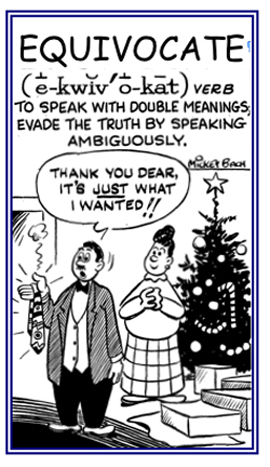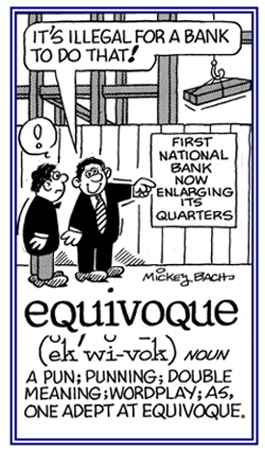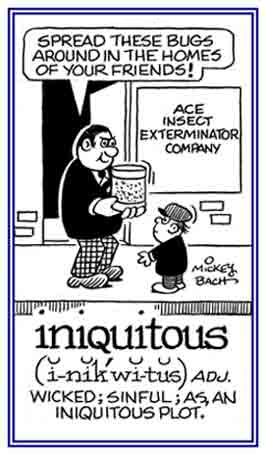equ-, equi-
(Latin: same, similar, even, uniform, identical; fair)
Don't confuse this unit with another equ- unit meaning horse.
1. A position or statement lacking clarity by virtue of having more than one meaning: Steven was known for his equivocalness because his answers could be interpreted this way or that way.
2. Being ambiguous, doubtful, dubious, indefinite, obscure, suspicious, and uncertain; such as, being naturally understood in one way, but it is also easily capable of having a different interpretation: Jack was quite unpredictable in stating exactly what he would like to do, and this equivocalness made it difficult for his friends to know what he wanted to do or not want to do when planning a trip for the weekend.
2. Being ambiguous, doubtful, dubious, indefinite, obscure, suspicious, and uncertain; such as, being naturally understood in one way, but it is also easily capable of having a different interpretation: Jack was quite unpredictable in stating exactly what he would like to do, and this equivocalness made it difficult for his friends to know what he wanted to do or not want to do when planning a trip for the weekend.
equivocate (verb), equivocates; equivocated; equivocating
1. To be deliberately ambiguous, or unclear, in order to mislead or to withhold information: The applicant for the job seemed to be equivocating when he was asked why he was leaving his current job and wanting to work with this other company.
2. To speak vaguely; especially, in order to avoid a commitment or to fool other people: The judge warned the witness at the beginning of her testimony not to equivocate when the attorney asked her for details about the crime that she saw taking place at the bank.

© ALL rights are reserved.
Go to this Word A Day Revisited Index
2. To speak vaguely; especially, in order to avoid a commitment or to fool other people: The judge warned the witness at the beginning of her testimony not to equivocate when the attorney asked her for details about the crime that she saw taking place at the bank.

Go to this Word A Day Revisited Index
so you can see more of Mickey Bach's cartoons.
1. Falsification by means of vague language: Lawyers always advise people not to use equivocations in their wills, but to be specific in what they want done.
2. An assertion that is not exactly wrong, but evades a disagreeable truth: The club’s president made an equivocation when he said that they could use a bit more money, when in fact they were deep in debt!
3. In logic, the two-fold meaning of a term which then creates a fallacy: Willfully distorting the facts can also be called an equivocation, when stating that someone took the keys to the car when, in fact, the driver was the one who did it!
2. An assertion that is not exactly wrong, but evades a disagreeable truth: The club’s president made an equivocation when he said that they could use a bit more money, when in fact they were deep in debt!
3. In logic, the two-fold meaning of a term which then creates a fallacy: Willfully distorting the facts can also be called an equivocation, when stating that someone took the keys to the car when, in fact, the driver was the one who did it!
1. A respondent who avoids giving a clear or direct answer: James, as an equivocator, was evading his mother’s questions about his homework when he said that he would be done in a minute, when, in fact, he hadn’t even started doing it!
2. Anyone who prevaricates or hedges when responding to a question: When asked directly for the politician's position on disarmament, he was a master equivocator and so he avoided presenting an honest response.
2. Anyone who prevaricates or hedges when responding to a question: When asked directly for the politician's position on disarmament, he was a master equivocator and so he avoided presenting an honest response.
1. A statement that is susceptible to different interpretations because it is vague or unclear: The equivoque that Shirley made left the others quite up in the air and they were not sure what she meant and so the problem was still unresolved.
2. A play on words, a double meaning, or an evasion of a point in an argument by raising irrelevant distinctions or objections: Nancy was the only one with an equivoke when the family was discussing the objectives in the upcoming vacation saying she didn’t want to go to Paris because it might rain!

© ALL rights are reserved.
Go to this Word A Day Revisited Index
2. A play on words, a double meaning, or an evasion of a point in an argument by raising irrelevant distinctions or objections: Nancy was the only one with an equivoke when the family was discussing the objectives in the upcoming vacation saying she didn’t want to go to Paris because it might rain!

Go to this Word A Day Revisited Index
so you can see more of Mickey Bach's cartoons.
1. A lack of an adequate quantity or number: Sally viewed the food supply and saw the inadequacy of certain ingredients for making dinner that evening.
2. A lack of competence; insufficiency: Debbie's inadequacy in swimming prevented her from joining her friends in the pool.
2. A lack of competence; insufficiency: Debbie's inadequacy in swimming prevented her from joining her friends in the pool.
inadequate
1. Failing to reach an expected or required level or standard.
2. Not adequate to fulfill a need or to meet a requirement; insufficient.
2. Not adequate to fulfill a need or to meet a requirement; insufficient.
inadequately
1. Descriptive of being too low in quality or too small in amount.
2. Characterized by not being enough.
2. Characterized by not being enough.
inequalities
1. Being unequal in quantities, measures, values, or conditions.
2. A state of being essentially unequally balanced.
3. Rights, treatments, quantities, or values being unequal to others in specific groups; such as, they are treated unequally under the law.
4. Equations in which the quantities on each side of an equal sign are not the same.
5. In mathematics, statements in which two quantities are not equal, made by placing the sign ≠ between them; or by the sign < or >, the angles being toward the symbols of smaller quantity.
6. The daily variations in the tides as a result of varying lunar influences.
2. A state of being essentially unequally balanced.
3. Rights, treatments, quantities, or values being unequal to others in specific groups; such as, they are treated unequally under the law.
4. Equations in which the quantities on each side of an equal sign are not the same.
5. In mathematics, statements in which two quantities are not equal, made by placing the sign ≠ between them; or by the sign < or >, the angles being toward the symbols of smaller quantity.
6. The daily variations in the tides as a result of varying lunar influences.
inequality
1. A social or economic disparity between people or groups.
2. An unequal opportunity or treatment based on social, ethnic, racial, or economic disparity.
3. Characterized by an instance of not being equal.
2. An unequal opportunity or treatment based on social, ethnic, racial, or economic disparity.
3. Characterized by an instance of not being equal.
inequity
1. Injustice; unfairness; lack of equity.
2. An instance of favoritism or bias.
3. An unfair circumstance or proceeding.
2. An instance of favoritism or bias.
3. An unfair circumstance or proceeding.
inequivalvular
Having unequal valves, as the shell of an oyster.
iniquitous (adjective), more iniquitous, most iniquitous
1. A reference to a person being immoral; especially, in a way that results in great injustice or unfairness: The academy prohibited any kind of iniquitous or bad behavior and practices, including those of cheating.
2. Characterized by wickedness and sinfulness: The religious school that Jane went to didn't allow the girls to wear short skirts or use lipstick because such practices were considered to be wicked and evil!

© ALL rights are reserved.
Go to this Word A Day Revisited Index
2. Characterized by wickedness and sinfulness: The religious school that Jane went to didn't allow the girls to wear short skirts or use lipstick because such practices were considered to be wicked and evil!

Go to this Word A Day Revisited Index
so you can see more of Mickey Bach's cartoons.
iniquitously
Characterized by iniquity or gross injustice and wickedness.
iniquity
1. A great injustice, gross wickedness, or extreme immorality.
2. A grossly immoral act.
3. A violation of right or duty; a wicked act; a sin.
4. Etymology: from Old French iniquité; from Latin iniquitatem, iniquitas, "unequalness, injustice"; noun of quality from iniquus, "unjust, unequal"; from in-, "not" + æquus, "just, equal".
2. A grossly immoral act.
3. A violation of right or duty; a wicked act; a sin.
4. Etymology: from Old French iniquité; from Latin iniquitatem, iniquitas, "unequalness, injustice"; noun of quality from iniquus, "unjust, unequal"; from in-, "not" + æquus, "just, equal".


